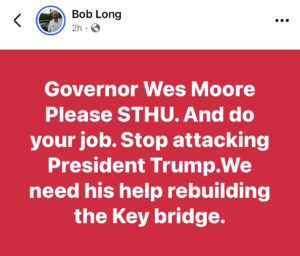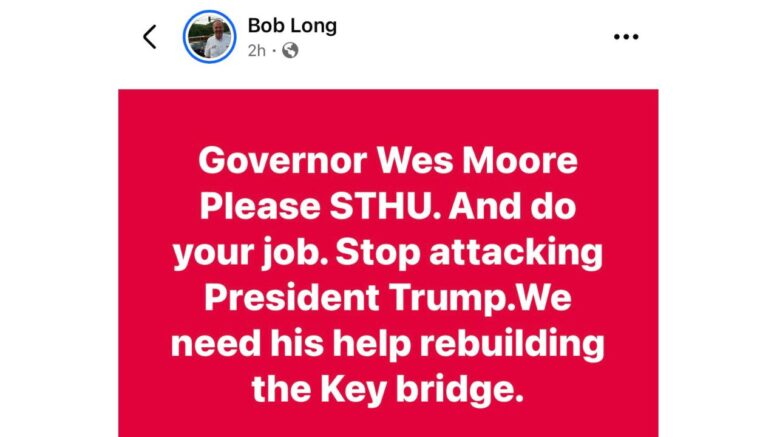Maryland State Delegate Bob Long (R-District 6) apparently missed the memo — or perhaps the entire legislative record of the last year.
The Baltimore County Republican took to Facebook on Tuesday, November 18, to offer some unsolicited advice to Maryland Governor Wes Moore regarding the Francis Scott Key Bridge rebuild.
In a post that can only be described as “legislation-free,” Long wrote:
“Governor Wes Moore Please STHU. And do your job. Stop attacking President Trump. We need his help rebuilding the Key bridge.”

Delegate Long’s premise is simple: If Gov. Moore hurts President Trump’s feelings, the president will take his ball and go home, leaving Maryland with a broken bridge and a massive bill.
There is just one problem with Delegate Long’s theory.
It is entirely false.
Here is the reality check that Delegate Long should read.
Baltimore’s “Help” Has Already Arrived (And It’s Called “The Law”)
Delegate Long seems to think that federal infrastructure funding is a personal checking account controlled by the president.
He implies that Mr. Trump can wake up tomorrow and decide, “I don’t like Wes Moore, so no bridge for Baltimore.”
Delegate, please allow me to introduce you to Article I, Section 9 of the U.S. Constitution, which grants the power of the purse to Congress, not the president.
More importantly, let’s look at the timeline that Delegate Long ignored:
-
December 2024: The American Relief Act, 2025 (H.R. 10545), was signed into law on December 21, 2024, by former President Joseph R. Biden Jr., and explicitly included the 100% federal cost-share provision for the Key Bridge.
-
The “Check” is Written: Buried in that massive spending package was the Baltimore BRIDGE Relief Act, federal legislation championed by now-retired U.S. Senator Ben Cardin and current U.S. Senator Chris Van Hollen.
-
The Mandate: That law explicitly authorized a 100% federal cost share for the replacement of the Francis Scott Key Bridge.
This isn’t a handshake deal, nor is it a campaign promise.
It is a federal statute.
The United States government is legally obligated to cover 100% of the eligible costs to rebuild that bridge. That obligation exists whether President Trump likes Governor Moore or not. The legislation uses binding language (“shall”) regarding the 100% cost share.
It is not a suggestion; it is a statute.
Civics 101: The President is Not a King (and the Key Bridge Check Cleared).
Delegate Long might argue, “Well, Trump is President now; he can just stop the check!“
But the president cannot legally do that.
A little history first: In 1974, Congress passed the Impoundment Control Act.
The Impoundment Control Act explicitly prevents a U.S. president from withholding appropriated funds due to political disagreements (“whether he likes Governor Moore or not”). To stop the funding, a president would need to sign a new law passed by Congress that rescinds the funds, which a president cannot do alone.
Congress passed this law specifically to prevent presidents (incidentally, Richard Nixon at the time) from refusing to spend money that the legislature had appropriated
If President Trump wanted to stop the Key Bridge funding, he would have to:
-
Send a “special message” to Congress requesting a rescission of the funds.
-
Wait for Congress to pass a new law approving that cut within 45 days.
-
If Congress does nothing (a certainty given the law’s bipartisan support), the Administration must release the funds.
A president cannot unilaterally “cancel” a major infrastructure project because of a feud with a current governor.
That is not how our government works.
The Real Issue with the Key Bridge Rebuild: Competence, Not Politics
To be fair, there is one grain of truth floating in the ether: The cost of the bridge has ballooned.
As of this week, estimates suggest the rebuild could cost between $4.3 and $5.2 billion, significantly higher than original projections.
It is possible — likely, even — that Maryland will need to work with the federal Department of Transportation to navigate these cost overruns. But framing this as a need for the president’s personal “help” demeans the legislative process.
We don’t need “help” or favors; we need the federal government to execute the law that is already on the books.
The Bottom Line: Delegate Bob Long is Playing Politics With Serious Policy
Delegate Bob Long’s Tuesday-morning Facebook post is a perfect example of the “Strongman Fallacy” — the belief that we must grovel before a leader to get basic government services.
We’re a democratic republic, not a monarchy (at least today). Maryland doesn’t need to beg, Delegate Long; we have the law on our side.
And frankly, we have a state delegate in District Six who might want to spend less time posting “STHU” on Facebook and more time reading the legislation that rebuilt his own state’s infrastructure and which will directly impact his district’s constituents.
Do your job, Delegate: Read the bill.
Stay off Facebook.

